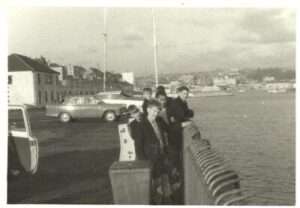“People like us, who believe in physics, know that the distinction between past, present, and future is only a stubbornly persistent illusion,” wrote Albert Einstein. His reflection upon the nature of spacetime might have been a reflection upon the nature of time in a deeply rooted rural community. There is no sense of time having flown by because the past seems eternally present,
In Huish Episcopi parish, my mothers’ family have been present in an unbroken line since since 1716. There is then a break in the written records before the next probable forebear in 1625. My grandmother’s family tree, Luxton, follows a direct documented line back to 1669. Thomas Luxton of Bampton, Devon is my great, great, great, great, great, great (that should be great six times) grandfather.
They were yeomen farmers working pocket handkerchief sized farms. Their families married into other local families and the cycle of life continued from generation to generation. Baptized in the medieval parish church, married there, buried within the walls of the churchyard; there was a reassurance in the continuity of the family.
It might seem a picture of timeless pleasantness, but the picture of rural life wasn’t as pleasant as it seems. In difficult times they lived in poverty, there is record of one family going to the workhouse, and death lurked at the door.
My great great great grandfather, Thomas Luxton moved to Aller where he married Hannah Sawtell in 1827. They had seven children. Jemima died at the age of one month in 1830. Daniel died at the age of four years in 1843, his baby brother William died at the same time at the age of four days, and they were buried on the same day. Four months after the death of her two youngest children Hannah herself died at the age of thirty-four. In the next generation there were fourteen children, six of whom were to die between the ages of four and twenty-one.
Reading through the family tree, there is a feeling for those forebears who endured such a catalogue of pain and heartbreak. Perhaps the sense of timelessness arises from the transmission of an hereditary meme. Perhaps the feelings that they had are as much part of the family heredity as the biological genes which have produced generations of people clearly identifiable as family members.
Past, present and future may be stubborn illusions in the field of theoretical physics, in our family they are only a means of determining to which generation a person might belong. When there is a sense of the presence of all the generations, time has never flown by.


